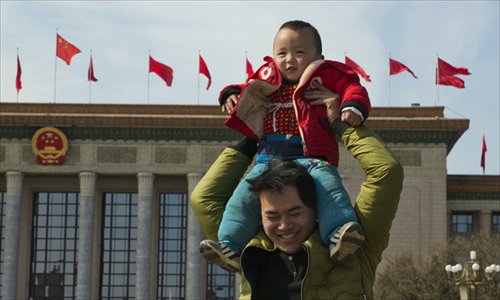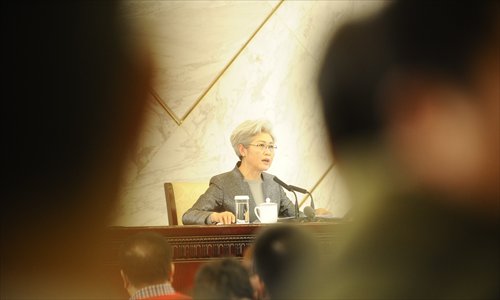NPC mulls local lawmaking
China to implement law-based taxation by 2020

A man carries a child on his shoulders as they pose for photos in front of the Great Hall of the People in Beijing on Wednesday. Thousands of representatives from all over the country are in the Chinese capital this week to attend the Chinese People's Political Consultative Conference and the National People's Congress. Photo: AP

Fu Ying, spokeswoman with the Third session of the 12th National People's Congress, answers questions from reporters at a Wednesday press conference in Beijing. Photo: Li Qian/GT

Chinese legislators will review draft amendments to the Legislation Law at the upcoming annual full session of the country's top legislature, a spokeswoman said Wednesday.
It is the first time that draft revisions to this law, which regulates the process of creating national laws, government regulations and local laws and defines legislative powers in the country, will be discussed by National People's Congress (NPC) deputies at a full session of the national legislative body.
"The empowerment of local-level lawmaking is designed to meet the needs of urbanization and reforms. Securing local lawmaking will focus on city management, urban construction and environmental protection, which will boost local initiatives," said Fu Ying, spokeswoman for the Third Session of the 12th NPC, at a Wednesday press conference.
The draft amendments to the Legislation Law were released to the public in August, 2014.
The amendments specified a division of legislative power between central and local levels, and would grant all city-level people's congresses legislative power.
Under the current law, only provincial capital cities or above are entitled to make laws, except in ethnic areas where autonomous counties and prefectures are allowed to do so.
Zhu Lijia, a professor of public management at the Chinese Academy of Governance, told the Global Times that "the amendment is conducive to making China a more orderly country ruled by law."
Li Shishi, director of the Commission for Legislative Affairs of the NPC Standing Committee, has previously pointed out the problem of local protectionism among lawmaking bodies, in addition to buck passing and fighting for power.
In late 2014, the city of Shenzhen abruptly began implementing a quota scheme on auto buyers, triggering immense debate and complaints, as the local government had repeatedly denied there were any such plans.
Yin Yicui, an NPC deputy from Shanghai, said that the Legislation Law aims to improve the quality of lawmaking by regulating legislative actions, the Beijing-based China Youth Daily reported.
"Lawmaking is a professional job, but we can offer ordinary people ways to participate in the process, such as attending legislation hearings," Yin said.
One of the new articles in the amendments designed to protect human rights stipulates that any regulation made by the State Council or local governments, in areas where laws and decrees are absent, must not infringe on citizens' rights or add to their obligations, Fu said.
Guangzhou-based newspaper Yangcheng Evening News said in an editorial that the amendment to the Legislation Law can help curb local governments' power to draft regulations as they please.
In reply to a question during the press conference, Fu said the draft amendments of the Legislation Law will facilitate Statutory Taxation, a term that literally requires all taxes to be approved by the legislature, instead of by government bodies.
Most of the taxes in China are levied by the State Council, since the 1985 NPC authorization to the State Council of taxation.
Thirty years on, arbitrary taxation has been a source of complaints, with the most recent case of the Ministry of Finance raising the fuel oil tax in January, which drew public criticism for insufficient legitimacy.
"Throughout the decades, China has accumulated enough experience of managing the economy through legal means, and therefore it's time for the NPC to retrieve the power of taxation," said Fu.
The draft amendments specifies that the NPC Standing Committee has the exclusive power of taxation through legislation, including creating, abolishing and managing a tax entity.
Once the amendment is approved in this session, all taxation activities will require legislation. It will need the NPC and its standing committee to make taxation into law when a new tax is levied, and any revision of taxes will also be achieved through legislation.
"The general objective is to fully practice the principle of Statutory Taxation by 2020," Fu said.
Xinhua contributed to this story
Read more in Special Coverage: